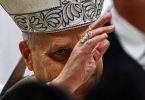
by Ngala Killian Chimtom
YAOUNDÉ, Cameroon (OSV News) — While Pope Francis has returned to Rome after his six-day apostolic trip to Congo and South Sudan, the words he left there will resonate across the continent for a long time, church leaders and experts say.
Catholic bishops in Congo said the words of the Holy Father not only comforted but shook up the continent, reviving hope that the nations may overcome the significant challenges they face.
“The successor of Peter, Pope Francis, as a good shepherd who knows his sheep, left us with powerful words which have strengthened our faith, revived our hope, ignited our love and challenged our consciences,” the bishops said in a Feb. 4 statement sent to OSV News.
Pope Francis spent four days in Congo, from Jan. 31-Feb. 3, before heading to South Sudan, from where he departed Feb.5.

In Congo, the pope spoke out against “economic colonialism” and called out developed nations against the wanton exploitation of Congo’s vast mineral resources.
“Hands off the Democratic Republic of the Congo! Hands off Africa! Stop choking Africa, it is not a mine to be stripped or a terrain to be plundered,” Pope Francis said to big applause.
Congo is rich in natural resources that have brought deadly conflict to the country.
The Holy Father also spoke about insecurity, and environmental destruction, and insisted on the need for love and tolerance in the world.
The spokesman for the Southern Africa Bishops’ Conference, Archbishop Stephen Brislin of Cape Town, told OSV News that the “hands off” comment was not only relevant to Congo but to the whole continent.
“Africa is rich in resources and yet, by and large, remains poor and underdeveloped,” he said, blaming economic colonialism for contributing to inequality through “the exploitation of those resources by foreign companies/countries with little benefit occurring to the local community.”

Johan Viljoen is the director of the Denis Hurley Peace Institute (the Catholic humanitarian foundation operating in South Africa named after the archbishop who was a critical voice of the church during the Apartheid). Viljoen told OSV News that across the continent, there is a “toxic cocktail” of gas and mineral resources; corrupt political elite; multinational corporations, “resulting in ‘armed conflicts’ (where, often, previously there were none) to drive local communities off their land.”
Describing it as “the Second Scramble for Africa,” he accused Western media of framing the story of Africa’s conflicts along ethno-religious lines, instead of focusing on the main root causes of conflict, which, according to Viljoen, is the scramble for Africa’s raw materials.
He added that Pope Francis’ comments are relevant to virtually every country in Africa.
“It is the voice of prophecy, the voice of God,” Viljoen said, adding that the pope’s message resonates around the continent. “From Mali to Mozambique, from Burkina Faso to the Central African Republic, people are saying: ‘That is exactly what is happening here, to us.'”
Viljoen said the pontiff’s message is particularly relevant because, since the beginning of the war in Ukraine, “Western governments have been desperate to secure oil and gas deals, disregarding human rights in the process.”

Political scientist and conflict resolution expert David Matsanga, CEO of Africa World Media, said in an online panel in which OSV News participated that the pope’s visit puts a spotlight on the conflicts in Congo and South Sudan, which are “largely underreported or ignored by Western media.”
“For the first time, the most influential religious leader flies to Africa to try and expose the exploitation of Africa and, to a certain degree, the failure of Africa itself to deal with the challenge of exploitation,” Simba Chikanza, a journalist from Zimbabwe, said on the same panel, called “Twitter spaces.”
And while Francis’ words have generated a “buzz” across the continent, resolving Africa’s problems remains the responsibility of Africans, said Viljoen.
He told OSV News that Africa can extricate itself from wanton exploitation by “overthrowing the repressive governments that are bleeding them dry.”
He underscored the need for building a new, fair, just and egalitarian society where “all people will have access to the necessary means to live a fulfilled life, in which they are able to reach their full potential” — a society, he added, “in which they will be empowered to resist attempts by outsiders to take over what is theirs.”
In his weekly general audience Feb. 8, Pope Francis said, mentioning the second leg of his trip to South Sudan that “there are those who abuse the name of God to justify violence and oppression.”
“This is why it is so important to bear witness that religion is fraternity, it is peace, it is communion; that God is the Father and always wants only life and the good of his children,” Pope Francis said.






